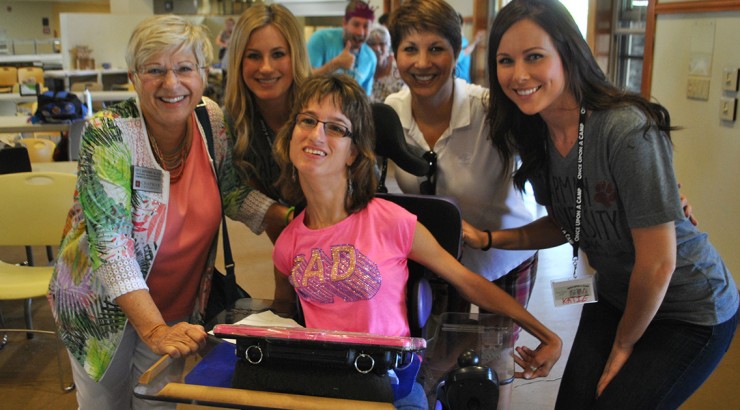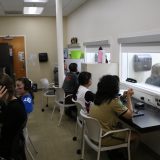
Community Stories CSD Students Present at Local Camp to Rise Above Disabilities
September 2, 2015
You think Disneyland is the happiest place on earth? Well, no offense to Mr. Disney, but we’re here to claim that title. Sure it’s cheesy, but we would challenge you to find a more fitting description. It’s called
RAD Camp
and it has a rad vision: to help its campers, aka “buddies”, and counselors alike to
R
ise
A
bove
D
isabilities. RAD Camp offers a one-of-a-kind or, as described by a buddy, “RAD-tastic”, camp experience for adults and children with developmental disabilities. It is a home away from home, a needed and well-deserved respite for parents and caregivers, and a place where volunteers experience moments that will inevitably change them forever.
RAD camp currently holds two camps per year, one for adults (18+) and one for children (4-17), aka “Rad Camp Jr.”. Both camps take place at the Irvine Outdoor Education Center every summer and are 100% volunteer run, with a 1:1 camper to counselor ratio, and 24-hour onsite nursing care. This all amounts to some impressive stats; RAD camp serves more than 200 campers, has more than 500 volunteers, with 98% of campers and 86% of volunteers returning every year! Sounds rad right? We thought so too, which is why we elected to complete our Capstone project at this special place. What was our Capstone you ask? Let us tell you.
As students of Crean College’s
Communication Sciences and Disorders
program, our graduate studies include the anatomy and physiology of the speech and swallowing mechanisms, as well as how to assess, diagnose and treat associated disorders. We learn quite a bit in graduate school, and as future speech-language pathologists (SLPs), we will be qualified to assess, diagnose and treat disorders of speech, language, voice, cognition, swallowing, and feeding. Try explaining all that to someone at a cocktail party!
Twenty-five percent of typically-developing children are reported to have a feeding disorder, with that number as high as 80% in children diagnosed with a variety of developmental disabilities. Feeding problems can range from difficulty with the mechanics of chewing and swallowing, to extreme sensory aversions to food, resulting in food refusal due to sensory processing difficulties as seen in Autism Spectrum Disorder (ASD).
As future SLPs, we are passionate about helping individuals become independent, safe eaters with healthy eating habits. Not only is safe chewing and swallowing necessary to avoid choking, but also proper nutrition, which includes eating a variety of (naturally) colorful foods, is critical for a person’s development, vitality and longevity. Equally as important, mealtime should be a fun and social event, free from anxiety; meals are a time to gather around the table with family and friends while not only sharing good food, but good conversation as well. Eating satiates hunger, but it also feeds our senses and emotions too! Being as passionate about mealtime as we are, we decided we wanted to offer our services at RAP camp by educating the camp counselors about the physical and psychological components of the eating process and assisting during mealtimes to make sure they were not only safe, but rad!
This August we had the honor of presenting on feeding to the counselors at RAD Camp Jr. where we educated them on the complex feeding needs across different diagnoses seen at camp, (i.e., ASD, Down Syndrome, and medically fragile, etc.), common food allergies, feeding safety, and the social aspects of eating. Our feeding empathy activity also gave the counselors an opportunity to step into the shoes of those buddies that are dependent on another to feed them, and we might have had a little fun in the process.
We were also present throughout the course of camp at all mealtimes to facilitate safe and social feeding for the buddies. We couldn’t have asked for a more magical place to complete our Capstone! The authentic radiance of joy that RAD camp puts in the hearts of all who attend could be felt throughout the week; from the excitement of buddy arrival (and the welcome party with a DJ!), to sharing meals together in the cafeteria. Then there was swimming in the grounds’ TWO gorgeous pools, watching movies outdoors on a cool August night, and the talent show on the last day which included some rad renditions of, you guessed it, Frozen’s “Let it Go!”.
In the spirit of making mealtime safe and rad for all, we want to leave you with three tips for how to help a person with feeding challenges enjoy the social aspects of eating:
- Be INCLUSIVE! When feeding a person with special feeding needs, be sure not to block them from the rest of the table and feed them from the side instead.
- Give CHOICES! Some may not be able to indicate with words or gestures what they want or don’t want to eat; try an eye-gaze system in which they indicate their preferred food items with their eyes. Giving choices during mealtime honors a person’s preferences and individuality.
- Be PATIENT! A person with complex feeding and communication needs often takes longer than the typical person to eat and communicate. Being patient and understanding eases mealtime anxiety and is conducive to a more social and accepting environment.
Bon appetite,
Kara Kempff and Katie Fazioli

Dr. Judy Montgomery, Kara Kempff, Angela Mandas, and Katie Fazioli with RAD Camp presenter Christine Horn, center.
We encourage you to learn more about RADcamp by visiting
www.radcamp.org
and follow them o
n Facebook.
RAD is a 501c3 charitable organization (Tax ID 46-4555223) and is produced solely by volunteers.
Article written by CSD graduate students Kara Kempff and Katie Fazioli. We greatly appreciate their time in sharing their experience and commitment to the local community! Photos by CSD Faculty
Angela Mandas
.




